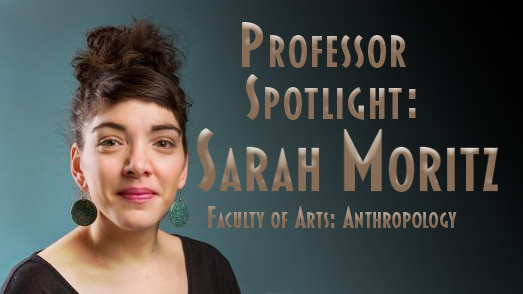Students can often be intimidated by their professors and may need help approaching them. Through this ongoing series, the Omega will introduce students to several professors at TRU, uncovering the humanity and personalities of our educators.
Sarah Moritz is an assistant professor of anthropology who considers herself an environmental and action anthropologist. She believes learning alongside her students and finding connections through stories are crucial in education. Moving to Canada from Germany, she discovered a home that she said was “rich and prosperous” and allowed her to pursue all her interests in one place.
Moritz’s journey in anthropology started in Germany, where she grew up. “When I graduated from German high school, I, unlike many of my peers, didn’t know what to study or what educational path to take. I had a few ideas, but they seemed to be diverging like medicine and law, languages, pedagogy… and environmental studies,” Moritz said. “I could not find a way to combine all of these, so I packed my backpack and booked myself a ticket with my grandma’s inheritance… I travelled to almost all places that have British colonialism, including Canada, the States, New Zealand, Australia, and different countries in Africa, South Africa and Togo, and I worked on organic farms. I worked on community projects. I worked with Indigenous communities, and when I came back [to Germany], I had a better sense of what I wanted to do.”
After returning to Germany, Moritz was told she was too late to join a university program in her home country. Someone suggested applying for a program in Scotland. “I packed that same backpack again, and I phoned the registrar at the University of Aberdeen, near the highlands… I flew to Scotland, and I [met] a wonderful advisor there and said, ‘This is what I have done in the last year; please advise me. What can I do?’ He said, ‘You are going to sign up for Anthropology,’” Moritz said. “I set foot in the Anthropology classroom, and I knew, ‘This is it. This is the right place for me.’”
Now, as an assistant professor of anthropology, Moritz said that she learned many of her teaching styles from various Indigenous communities she has worked with. She believes in learning alongside her students and growing together as a community.
“I also think that being a professor […] teaches you a sufficient amount of modesty or humility to know that we all coexist. We are not better or worse. We’re all here in this space together. We are all walking the same direction together, and ideally, we want to leave this place in a good way for our future generations,” Moritz said. “I see my students as my teachers and as colleagues.”
In the classroom, Moritz incorporates something called “gifts of knowledge.” Gifts of knowledge are when she or her students share personal stories, art, objects, food and more that show insight into the culture and personal lives of everyone in the classroom. Moritz said she learned about sharing gifts of knowledge many years ago from a Salish elder.
“It is something that is good for [all] of us and by extension to all of our communities. I can bring gifts of knowledge as someone who has been training and learning and teaching for a long time, but you also can,” Moritz said. “I think that gifts of knowledge equip us with the tools that we need to live more ethical, sustainable and reciprocal lives.”
Moritz invites more students to try anthropology and hopes to continue to grow with her students in the future.
The Omega’s Professor Spotlight is a new weekly series where we reintroduce you to some of the universities most popular faculty members. If you would like to nominate a professor, lecturer, or sessional instructor for their own Professor Spotlight, you’re encouraged to email the Omega’s arts editor, Augustus Holman, by email at auggietaylor6284@gmail.com.

